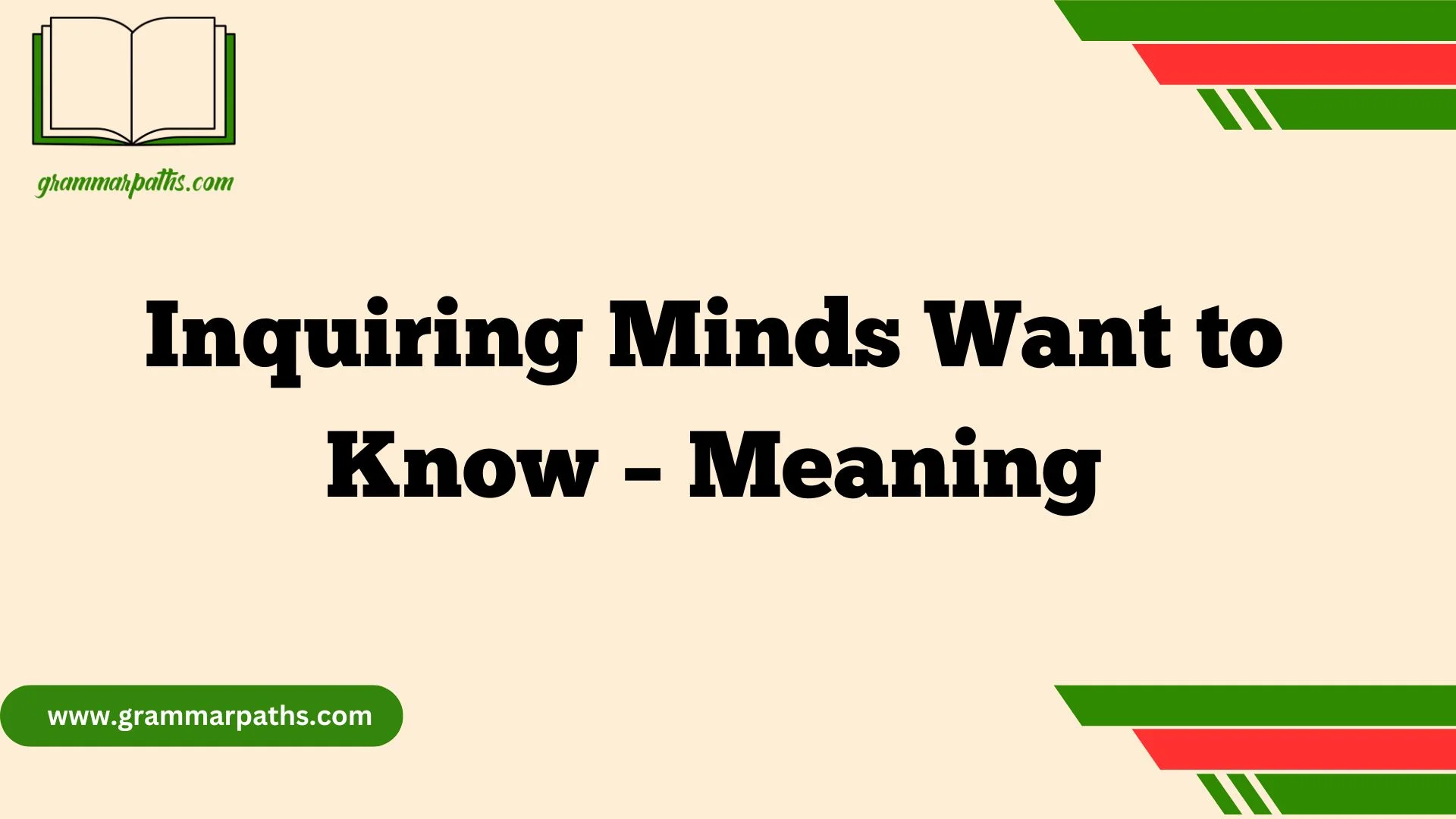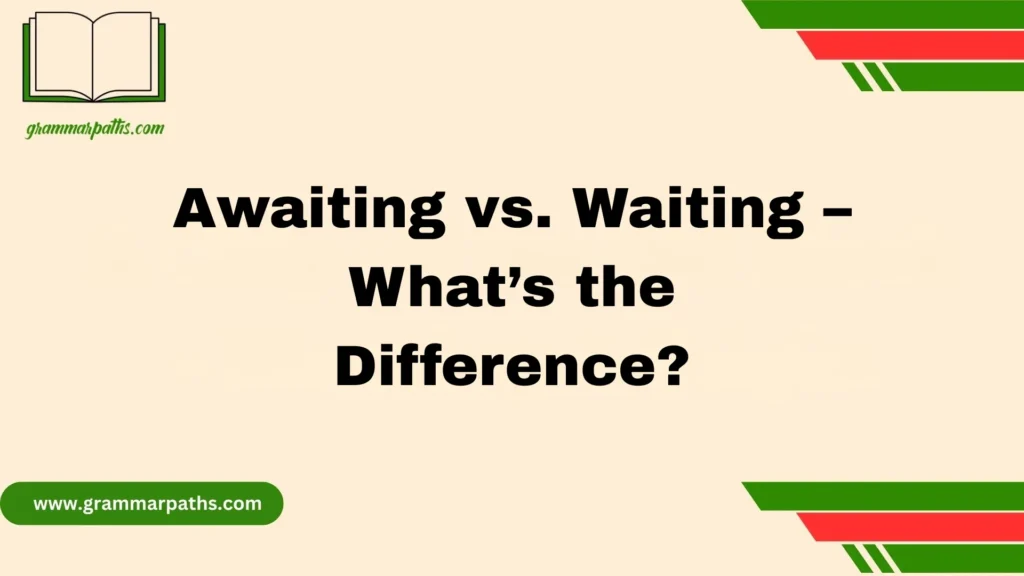The phrase “Inquiring Minds Want to Know” captures the essence of curiosity, a powerful trait that drives learning, discovery, and personal growth. Rooted deeply in education and culture, it reflects the natural urge to seek answers, explore new ideas, and understand the unknown. Whether you’re a student, educator, or writer, embracing this mindset can open doors to endless possibilities. In this article, we’ll uncover the origin, explore its meaning, and provide real-world examples of how this phrase ignites intellectual passion.
In my experience, this phrase is more than just an expression—it’s a call to action. It encourages critical thinking and a relentless pursuit of truth and insight. When we let our minds ask, wonder, and explore, we not only gain valuable knowledge, but also contribute to the progress of human understanding. The power of inquiry lies at the core of every breakthrough, pushing us all to never stop learning.
What Does “Inquiring Minds Want to Know” Really Mean?
At its core, this phrase celebrates active curiosity—the drive to dig deeper, to question what’s presented, and to understand the why behind things.
It combines two key ideas:
- Inquiring minds – People who actively seek out information and truth
- Want to know – A desire that’s persistent, not passive
In contrast to casual curiosity, inquiry involves intentional investigation, usually with a goal in mind.
This phrase is often used:
- To signal that a question deserves an answer
- As a humorous or ironic way to probe a secret
- To express genuine interest in uncovering facts
It’s both playful and serious—perfect for pop culture, education, or journalism.
Origin and Evolution of the Phrase
While it sounds timeless, “Inquiring minds want to know” has a very specific origin.
The National Enquirer and Its Catchphrase
The phrase was popularized in the 1980s by The National Enquirer, a US tabloid magazine known for sensational headlines. Their ad campaigns often featured:
“Enquiring minds want to know… Read The National Enquirer!”
Interestingly, the original spelling was “Enquiring” (British English), but the Americanized “Inquiring” version took off in popular usage.
The phrase became a cultural slogan, used both sincerely and sarcastically. It fed into the 1980s tabloid culture—where shocking headlines and outrageous claims captured readers’ attention.
How Dictionaries Define the Phrase
Most major dictionaries don’t list the phrase as a standalone idiom, but they define its components clearly:
| Term | Definition |
| Inquire | To ask about something; to investigate; to seek information |
| Inquiring Mind | A person characterized by curiosity, a desire to learn, and analytical thinking |
The phrase is often used figuratively. It doesn’t literally mean a group of people are asking—it represents the broader public’s thirst for answers.
Why the Phrase Still Resonates Today
This expression has stuck around for one big reason: curiosity is human nature.
People want answers. We’re wired to ask:
- Why?
- What if?
- How does this work?
- What really happened?
The Psychology of Curiosity
Curiosity activates the brain’s reward system. Studies show that when we’re curious, dopamine levels rise. This means:
- We retain information better
- We stay engaged longer
- We feel a sense of satisfaction from learning
In other words, inquiring minds are built for discovery.
The Inquiry Mindset: What It Really Means to Inquire
Inquiry is more than just asking questions. It’s a structured way of thinking and learning.
Elements of Inquiry:
- Asking deep, meaningful questions
- Seeking evidence—not just opinions
- Thinking critically about information
- Reflecting on what’s learned
Inquiry is deliberate. It’s how we investigate complex problems, test hypotheses, or explore unfamiliar ideas.
Educational Context: Inquiry-Based Learning
Few figures have shaped this idea more than John Dewey, the father of progressive education in the United States.
John Dewey’s Key Beliefs
- Learning happens best through experience, not memorization
- Students should explore, question, and interact with ideas
- Inquiry is the foundation of critical thinking
Dewey didn’t just talk about asking questions—he built a learning model around it.
Modern Impact: 21st Century Learning Standards
Today, inquiry-based learning is a core feature of education standards like:
- Next Generation Science Standards (NGSS)
- Common Core State Standards
- International Baccalaureate (IB) Programs
These models push students to:
- Form hypotheses
- Analyze data
- Collaborate on investigations
- Present findings backed by evidence
Subjects Where Inquiry-Based Learning Thrives:
- Science and STEM
- History and Social Studies
- Language Arts and Debate
- Art and Design Thinking
Educators encourage inquiring minds to drive the learning process—not just follow it.
“Inquiring Minds” in Academic and Professional Environments
Academic Use
In higher education, this phrase reflects a mindset of exploration and discovery.
Professors often encourage:
- Independent research
- Literature reviews
- Debates and scholarly inquiry
Example:
A biology professor may say, “Inquiring minds want to know what causes cell mutation under radiation.” It’s both a prompt and a challenge.
Professional Use
In business, law, healthcare, and journalism, the phrase takes on strategic significance.
Where “Inquiring Minds” Excel Professionally:
- Journalism: Investigative reporters thrive on uncovering hidden truths.
- Science & R&D: Hypothesis-driven testing requires strong inquiry.
- Consulting: Solving complex problems means asking smart questions.
- Leadership: Great leaders ask, not assume.
Quote:
“The art and science of asking questions is the source of all knowledge.” – Thomas Berger
In professional settings, inquiry drives innovation.
Pop Culture & Media References
From late-night shows to sitcoms, the phrase pops up in all kinds of cultural moments.
Where You’ve Probably Heard It:
- The Simpsons: Used humorously to poke fun at tabloid culture
- Saturday Night Live: Sketches parodying celebrity gossip
- Movie scripts: Often used as a tongue-in-cheek remark
- Social media: Memes and GIFs referencing hidden secrets
It’s used playfully but always tied to a sense of uncovering something hidden.
Real-Life Examples and Case Studies
Case Study 1: NASA’s Perseverance Rover
NASA scientists, driven by inquiring minds, built and launched the Perseverance Rover to explore Mars.
Their key question:
Could Mars have supported microbial life?
This wasn’t idle curiosity. It was a structured inquiry that involved years of research, billions in funding, and global collaboration.
Case Study 2: Investigative Journalism – Watergate
Bob Woodward and Carl Bernstein’s reporting on the Watergate scandal began with simple, persistent questions.
Why was the Democratic National Committee headquarters burglarized?
Their inquiring minds led to the exposure of one of the most significant political scandals in US history.
How to Develop and Cultivate an Inquiring Mind
Curiosity can be trained, like a muscle. Here’s how to strengthen it:
Actionable Tips:
- Ask more “why” and “how” questions
- Practice critical reading – look beyond the headline
- Challenge your assumptions
- Surround yourself with curious people
- Use journals to track questions and discoveries
Books That Encourage Inquiry:
- A More Beautiful Question by Warren Berger
- Think Again by Adam Grant
- How to Read a Book by Mortimer J. Adler
Daily Habits to Spark Inquiry:
- Read something outside your field of expertise
- Write down three questions a day
- Engage in thoughtful debates
Summary & Takeaway
“Inquiring minds want to know” is more than a slogan—it’s a mindset. It represents a hunger for knowledge, a commitment to truth, and a fearless approach to questioning the world around us.
Whether you’re a student, professional, or life-long learner, nurturing your inquiring mind can:
- Improve decision-making
- Foster innovation
- Deepen understanding
- Build stronger communication skills
So the next time you hear the phrase, embrace it. It means you’re on the path to growth.
Visual Aids and Tables
Diagram: The Inquiry Process
[Visual suggestion for layout]
- Question → 2. Investigate → 3. Analyze → 4. Conclude → 5. Reflect → 6. Share
Table: Curiosity vs Inquiry
| Trait | Curiosity | Inquiry |
| Nature | Spontaneous, emotional | Structured, logical |
| Goal | Satisfy interest | Solve a problem or understand deeply |
| Method | Casual observation | Active research and questioning |
| Tools | Exploration, browsing | Analysis, synthesis, evaluation |
List: 10 Famous Inquiring Minds in History
- Socrates – Father of critical questioning
- Leonardo da Vinci – Artist and scientist
- Galileo Galilei – Challenged scientific dogma
- Marie Curie – Pioneer in radioactivity research
- Albert Einstein – “I have no special talent. I am only passionately curious.”
- Carl Sagan – Made science accessible through inquiry
- Jane Goodall – Revolutionized primate research
- Rachel Carson – Environmental trailblazer
- Steve Jobs – Visionary innovator
- Malala Yousafzai – Advocate for girls’ education
FAQs
Is “Inquiring minds want to know” meant to be sarcastic?
Sometimes. It depends on tone and context. It can be sincere or playful.
Where did the phrase originate?
From The National Enquirer ad campaigns in the 1980s.
Is this phrase still used?
Yes, especially in education, journalism, and pop culture.
What’s the difference between being curious and being inquiring?
Curiosity is the spark; inquiry is the process that follows it.
Can I use this phrase professionally?
Yes—especially in teaching, science, research, or investigative work.
Conclusion:
In conclusion, the phrase “Inquiring Minds Want to Know” is far more than a catchy saying—it’s a celebration of the human drive to learn, question, and explore. It reminds us that curiosity is the foundation of growth, whether in education, research, or everyday life. By embracing this mindset, we unlock the door to creativity, innovation, and lifelong learning. So whether you’re a student searching for truth, a teacher inspiring young minds, or simply someone who loves to ask “why,” let this phrase guide your journey. Because at the heart of every great discovery is one simple, powerful spark: an inquiring mind.

Grace Marie is the dedicated writer behind GrammarPaths.com, where she shares her passion for English grammar, idioms, and writing mastery. With a strong background in language studies and years of experience helping learners improve their communication skills, Grace creates clear, practical, and engaging content that makes English easy to understand.










